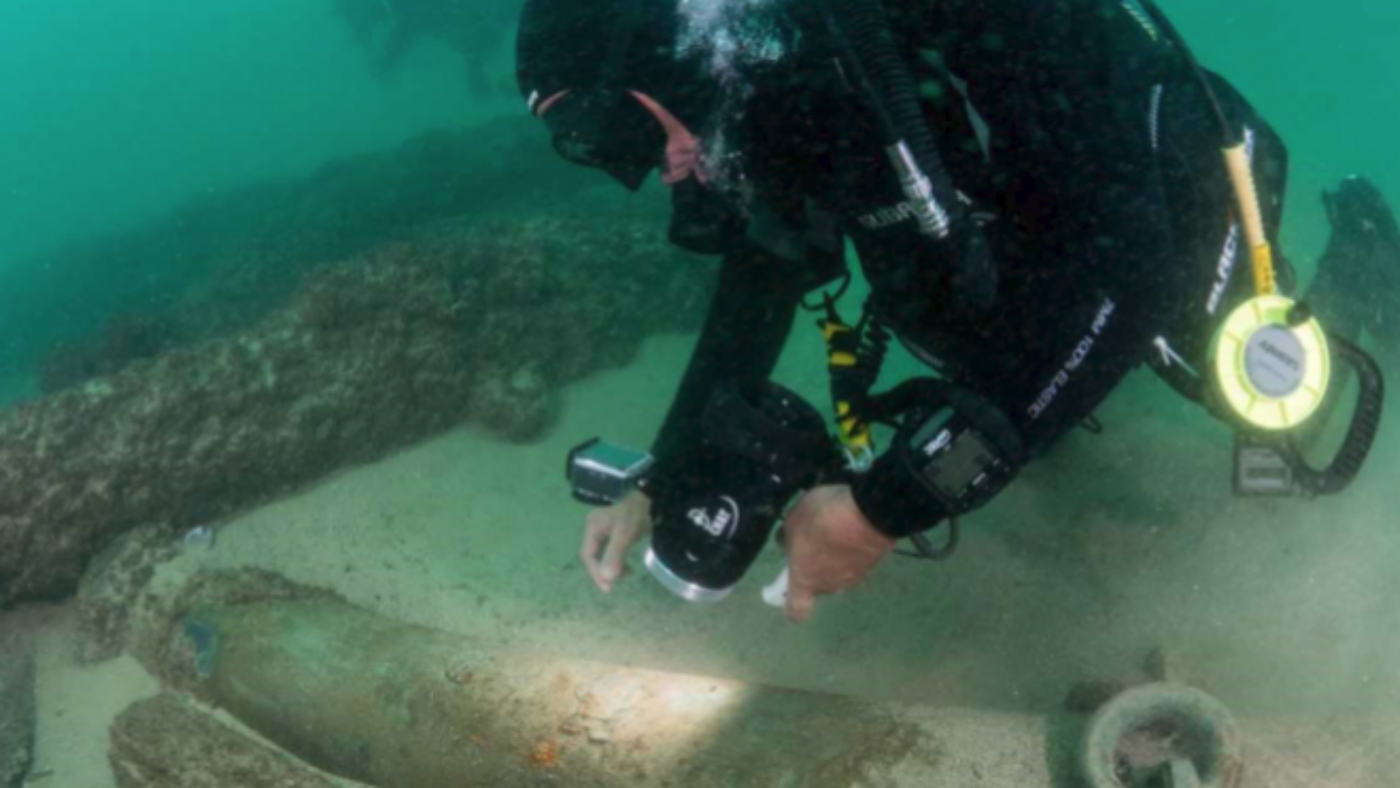What is inside the 400-year-old shipwreck found near Portugal?
Cargo of wrecked trading ship is ‘very well-preserved’, say archaeologists

A free daily email with the biggest news stories of the day – and the best features from TheWeek.com
You are now subscribed
Your newsletter sign-up was successful
Experts are hailing a 400-year-old shipwreck found off the Portuguese coast as “the discovery of the decade” due to its hoard of historical treasures.
Archaeologists spotted the 100m-long wreckage on the sea bed near Cascais, a popular resort on the western fringe of Lisbon, earlier this month.
Based on clues from the cargo, archaeologists believe the as-yet-unidentified trading ship was returning home from a voyage to India laden with valuable spices when it sank in the late 16th or early 17th century.
The Week
Escape your echo chamber. Get the facts behind the news, plus analysis from multiple perspectives.

Sign up for The Week's Free Newsletters
From our morning news briefing to a weekly Good News Newsletter, get the best of The Week delivered directly to your inbox.
From our morning news briefing to a weekly Good News Newsletter, get the best of The Week delivered directly to your inbox.
“From a heritage perspective, this is the discovery of the decade,” said project director Jorge Freire.
Initial examinations have revealed that the contents of the ship are “very well-preserved” and offer fresh insight into maritime history during the age of the fabled spice route.
“This is a great discovery and its greatness lies in what it, and the artefacts, can tell us about the cultural landscape,” he said.
So what has been recovered so far?
A free daily email with the biggest news stories of the day – and the best features from TheWeek.com
Spices: Traces of peppercorns found in the wreckage help identify the purpose of the vessel. Archaeologists believe the ship was wrecked between 1575 and 1625, “when Portugal’s spice trade with India was at its peak”, Reuters reports.
Chinese porcelain: Pieces of Chinese ceramics found at the wreck site have been identified as belonging to the Wanli period, which lasted from 1573 to 1619, helping researchers narrow down the timeframe in which the shipwreck occurred, The Guardian reports.
Cannons: One of the most exciting finds, the ship’s artillery includes nine bronze cannons engraved with the Portuguese coat of arms.
Cowry shells: Seemingly innocuous, the small, jagged-edged shells carried by the vessel hide a dark chapter in Portuguese history. The country played a key role in the early days of the Atlantic slave trade, when cowry shells were frequently used as currency between slave traders along the African coast, says Reuters.
-
 Properties of the week: pretty thatched cottages
Properties of the week: pretty thatched cottagesThe Week Recommends Featuring homes in West Sussex, Dorset and Suffolk
-
 The week’s best photos
The week’s best photosIn Pictures An explosive meal, a carnival of joy, and more
-
 The ‘ravenous’ demand for Cornish minerals
The ‘ravenous’ demand for Cornish mineralsUnder the Radar Growing need for critical minerals to power tech has intensified ‘appetite’ for lithium, which could be a ‘huge boon’ for local economy
-
 Epstein files topple law CEO, roil UK government
Epstein files topple law CEO, roil UK governmentSpeed Read Peter Mandelson, Britain’s former ambassador to the US, is caught up in the scandal
-
 Iran and US prepare to meet after skirmishes
Iran and US prepare to meet after skirmishesSpeed Read The incident comes amid heightened tensions in the Middle East
-
 Israel retrieves final hostage’s body from Gaza
Israel retrieves final hostage’s body from GazaSpeed Read The 24-year-old police officer was killed during the initial Hamas attack
-
 China’s Xi targets top general in growing purge
China’s Xi targets top general in growing purgeSpeed Read Zhang Youxia is being investigated over ‘grave violations’ of the law
-
 Panama and Canada are negotiating over a crucial copper mine
Panama and Canada are negotiating over a crucial copper mineIn the Spotlight Panama is set to make a final decision on the mine this summer
-
 Why Greenland’s natural resources are nearly impossible to mine
Why Greenland’s natural resources are nearly impossible to mineThe Explainer The country’s natural landscape makes the task extremely difficult
-
 Iran cuts internet as protests escalate
Iran cuts internet as protests escalateSpeed Reada Government buildings across the country have been set on fire
-
 US nabs ‘shadow’ tanker claimed by Russia
US nabs ‘shadow’ tanker claimed by RussiaSpeed Read The ship was one of two vessels seized by the US military